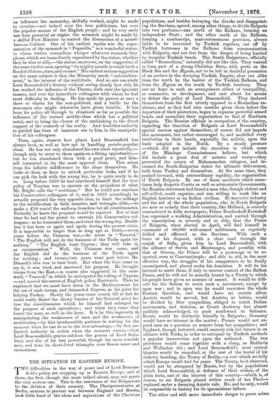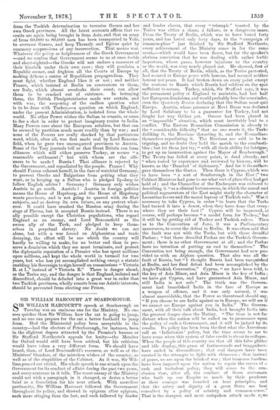THE SITUATION IN EASTERN EUROPE. T WO difficulties in the way
of peace and of Lord Beacons- field's policy are cropping up in Eastern Europe, and of these, the first, though the most talked about, may not prove the only serious one. This is the resistance of the Bulgarians to the division of their country. The Plenipotentiaries at Berlin, anxious to prevent war between England and Russia, took little heed of the ideas and aspirations of the Christian populations, and besides betraying the Greeks and disappoint- ing the Servians, agreed, among other things, to divide Bulgaria into two portions,—one north of the Balkans, forming an independent State ; and the other south of the Balkans, forming a nondescript, semi-autonomous province, always liable to be traversed by Turkish regulars, cut off by Turkish fortresses in the Balkans from communication with Bulgaria, and not free from the danger of being harried by irregular Turkish bands. The South Bulgarians, officially called " Roumelians," naturally did not like this. They wanted to form part of a strong Christian State, with ports on the Black Sea and the .2Egean, not to be left in doubtful possession of an enclave in the decaying Turkish Empire, shut out alike from the north by the barrier of the Turkish Balkans, and from the ./Egean on the south by Turkish territory. They saw no hope in such an arrangement either of tranquillity, or commerce, or development, and cast about for means to defeat the policy of Lord Beaconsfield. They declared themselves from the first utterly opposed to a Roumelian ex- istence, and as they had nine months given them before the departure of their protectors, began to organise powerful armed bands, and assimilate their organisation to that of Northern Bulgaria. The Russian officials in occupation of the country, regarding the bisection of Bulgaria as Lord Beaconsfield's special success against themselves, of course did not impede this movement, but rather encouraged it, and modelled every institution in their hands, especially the militia, upon the basis adopted in the North. By a steady pressure —which did not include the atrocities in which some of the Rhodope Commissioners believe, but which did include a great deal of menace and worry—they prevented the return of Mahommedan refugees, and in- creased the South-Bulgarian desire for ultimate deliverance, both from Turkey and themselves. At the same time, they pushed forward, with extraordinary rapidity, the organisation of North Bulgaria. By one of those accidents which some- times help despotic Courts as well as aristocratic Governments, the Russian statesmen had found a man who, though violent and self-willed, could organise, and was willing to work like an English banister or an Indian civilian. By excessive industry and the aid of the whole population, who in North Bulgaria are now so orderly that their country, like Holland, is scarcely remembered in daily newspapers, Prince Don doukoff-Korsakoff has organised a working Administration, and carried through the conscription so severely and so ably, that the Prince of Bulgaria, when elected in April, will find himself in command of 80,000 well-armed militiamen, as regularly drilled and officered as the Servians. With such a force at his disposal, with a clear road through the sanjak of Sofia, given him by Lord Beaconsfield, with the alliance of Servia and Montenegro, and possibly with that of Greece, the Prince will be a personage to be re- spected, even at Constantinople ; and able to aid, in the most effective way, the struggles of his compatriots to be finally emancipated, and placed under his dominion. It will be his interest to assist them, if only to recover control of the Balkan Passes, and he will not be morally bound by a Treaty to which his people have given no manner of assent. It would be diffi- cult for the Sultan to resist such a movement, except by open war ; and in open war he would reawaken the whole Eastern Question, and would have no certain allies. Austria would be moved, but Austria, as before, would be divided by Slav sympathies, obliged to watch Italian movements, and desirous, as Count Andrassy has almost publicly acknowledged, to push southward to Salonica.
Russia would be distinctly friendly to Bulgaria ; Germany would have no interest in the matter ; France would not ex- pend men on a question so remote from her sympathies ; and England, though irritated, would scarcely risk her future in an alliance with Turks, in order to extirpate by Turkish methods a popular insurrection not upon the seaboard. The two provinces would come together with a clang, as Moldavia and Wallachia did ; and Lord Beaconsfield's most cynical blunder would be remedied, at the cost of the burial of his ricketty bantling, the Treaty of Berlin,—a cost which we fully admit Europe would feel for years. The Treaty, be it observed, would not be abrogated by Russia, but by the populations which Lord Beaconsfield, in defiance of their wishes, of the plain facts, and of the interest of this country—which is, of course, to see Bulgaria placed within reach of her Fleet— replaced under a decaying Asiatic rule. He, and he only, would be responsible in history for its ignominious failure.
The other and still more immediate danger to peace arises from the Turkish determination to terrorise Greece and her own Greek provinces. All the latest accounts affirm that re- cruits are again being brought in from Asia, and that an army of from 60,000 to 80,000 men has been transported to Volo, to overawe Greece, and keep Thessaly and Epirus quiet by summary suppressions of any insurrection. That means war. Whatever the policy or helplessness of the Greek Government —and we confess that Government seems to us at once feeble and short-sighted—the Greeks will not endure a massacre of their kinsfolk under their own eyes ; they will proclaim a Republic sooner, and frighten all the Courts of Europe by making Athens a centre of Republican propagandism. They must fight, whether England likes it or not ; and neither France, which insisted at Berlin on concessions to them, nor Italy, which almost overlooks their coast, can allow them to be crushed out of existence. In betraying them, the British Plenipotentiaries made war certain, and with war, the reopening of the endless question what is to be done with Turkey,—a question on which England, under the present Administration, is isolated from the whole world. No other Power wishes the Sultan to remain, or cares to fire a shot in order to protect imaginary routes to India. Many Powers care about the European solution, but that can be secured by partition much more readily than by war ; and none of the Powers are really shocked by that portentous word, which, after all, was first made real by Lord Beacons- field, when he gave two unconquered provinces to Austria. Some of the Tory journals tell us that Great Britain can form alliances which will either preserve Turkey, or secure " a reasonable settlement ;" but with whom are the alli- ances to be made ? Russia ? That alliance is rejected by the Government, and repudiated by the people. France ? Why should France exhaust herself, in the face of watchful Germany, to prevent Greeks and Bulgarians from getting what they want, or in keeping up a Sultan who is pledged lip-deep to follow English advice ? Germany ? Germany only wishes Austria to go south. Austria ? Austria in foreign politics means the House of Hapsburg, and the House of Hapsburg wants provinces, and is not going to quarrel with its Slav subjects, and so destroy its own future, on any pretext what- ever. It could have crushed the Russian army during the siege of Plevna, but it accepted Bosnia instead. There is no ally possible except the Christian populations, who regard England as an enemy, and Lord Beaconsfield as the sworn ally of the Turk, and pledged to keep them- selves in perpetual slavery. No doubt we can act alone, but with a war forced on Afghanistan and trade decaying, the effort will be one which the country will hardly be willing to make, for no better end than to pre- serve a dominion which they see must terminate, and protect the diplomatic reputation of a Premier who has spent millions upon millions, and kept the whole world in turmoil for two years, but who has yet accomplished nothing except a statute enabling his Sovereign to sign herself on commissions "Victoria R. et I.," instead of "Victoria R." There is danger ahead, as the Tories say, and the danger is that England, isolated and discredited, should be deluded into a great war in order that two Turkish provinces, wholly remote from our Asiatic interests, should be prevented from electing one Prince.



































 Previous page
Previous page